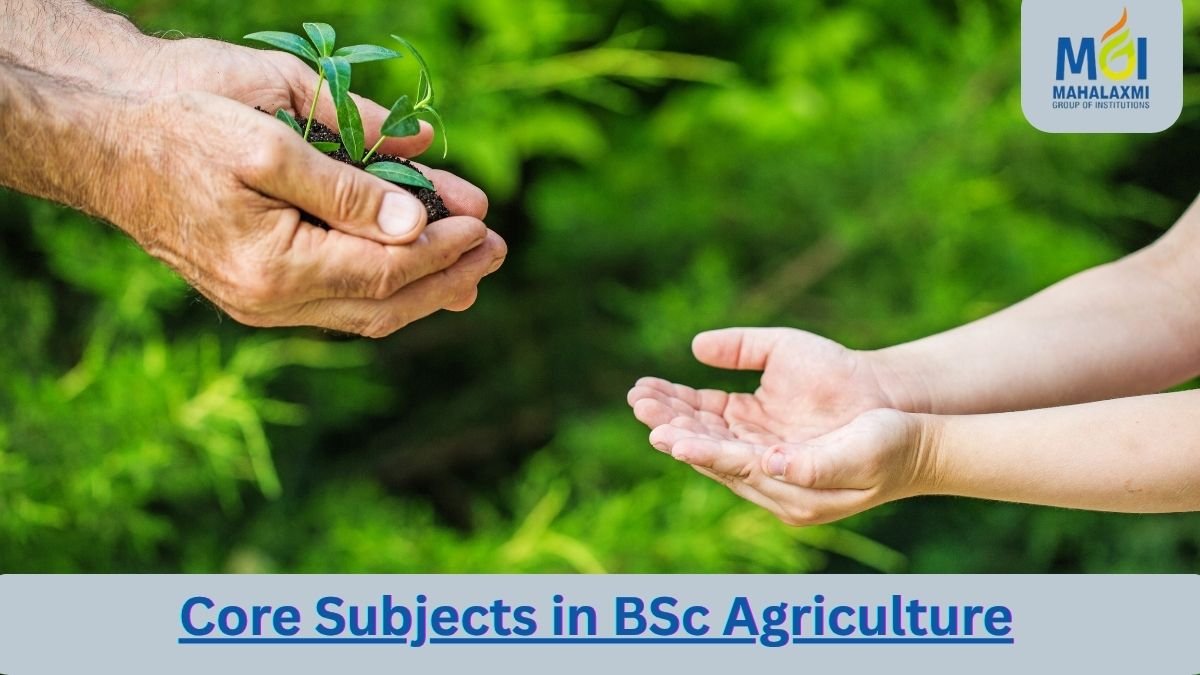B.Sc. (Home Science)
B.Sc Home Science is a 3 year full-time…

When someone says agriculture, many think only of farming. But there's a lot more going on behind growing crops. If you're thinking about a BSc in Agriculture, you should know exactly what subjects you're going to deal with. At MGI Meerut, our BSc Agriculture course covers the practical and theoretical parts of farming, science, and agri-business. Let’s break down the core subjects in BSc Agriculture in a way that’s easy to follow.
1. Agronomy – Basics of Crops and Fields
This subject teaches how to grow crops better. You’ll learn about soil, water, climate, and the best time and way to plant seeds. It’s also where you learn how to manage farms efficiently, use tools properly, and reduce waste.
2. Genetics & Breeding of Plants
In this subject, you go deep into how plant genes work. You’ll see how new plant varieties are developed and how farmers get better yield through hybrid seeds. If you ever wondered how scientists make disease-resistant crops — this is the subject that explains it all.
3. Soil Science – Know Your Ground
Before anything is planted, the soil has to be right. Soil science tells you what makes soil healthy, what nutrients it lacks, and how to balance it using fertilizers or natural compost. Good soil means strong crops. This subject helps you test and improve it.
4. Horticulture – Fruits, Flowers, and Vegetables
This part of the course is all about gardening at a commercial level. You’ll study how to grow vegetables, fruit trees, and flowering plants. Greenhouse farming, nursery techniques, and storage after harvest also fall under this topic.
5. Plant Diseases and Protection
Plants can fall sick too. This subject shows you how to spot signs of infections and what to do about them. From fungus to bacteria, you’ll cover it all — along with ways to keep crops safe without harming the environment.
6. Insect Study – Friends and Foes
While studying, you’ll come across many insects — some are helpful, others cause serious crop damage. Creatures like butterflies and honeybees are actually your allies, while pests such as borers and locusts can ruin entire harvests.
The goal here isn’t just to identify bugs. You’ll also explore how to keep crops safe using methods that don’t harm the environment — think natural repellents, crop rotation, and smart pest management rather than heavy chemical use.
7. Weather and Agriculture
Farming depends a lot on weather. This topic helps you understand how rain, heat, and moisture impact farming.
You’ll figure out how to plan your crops based on the changing seasons.
It also covers how climate change is making weather less predictable — and how farmers can get ready for that.
8. Agri Economics and Business
Farming is also a business. You’ll study how to calculate costs, profits, supply, demand, and market prices. It prepares you for real-world agri-business or running your own farm like a professional.
9. Rural Extension
This is where you learn how to work with farmers in villages. It teaches how to spread awareness about new techniques, organize training programs, and communicate in simple terms. It’s a great subject if you want to work in the development sector or government roles.
10. Farm Machinery
Modern farming needs machines. This subject helps you understand tractors, seeders, ploughs, and even solar-powered gadgets. You'll learn how to use and maintain them — especially useful if you’re planning to go into agri-tech.
Apart from these main subjects, you’ll also go through:
Each semester blends classroom learning with practical sessions.
At MGI Meerut, your learning goes beyond books. We send students for fieldwork, lab sessions, and even village-based training.
You'll also get exposure through live demos, group projects, and real farm case studies — all designed to make you ready for jobs or your own ventures.
Q1. Will I need science in 12th to take BSc Agriculture?
Yes, most colleges require Physics, Chemistry, and Biology or Agriculture in 12th standard.
Q2. Are practicals compulsory in every subject?
Yes. Agriculture can't be learned from books alone. Fieldwork is an important part of the course.
Q3. What’s the future after this degree?
You can go for MSc, government jobs (like agriculture officer), agri-business, or start your own farm enterprise.
The core subjects in BSc Agriculture shape your career by teaching everything from seed to market. If you're truly interested in working in a field that feeds the nation, this course is a strong step forward. For admission details or counselling, visit MGI Meerut today.
